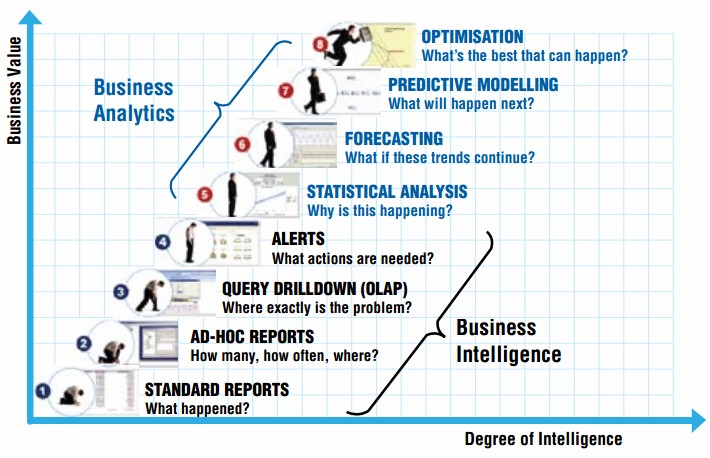Business analytics (BA) refers to the skills, technologies, practices for exploration and investigation of past business performance to gain insight and drive business planning. Business analytics focuses on developing new insights and understanding of business performance based on data and statistical methods. In contrast, business intelligence traditionally focuses on using a consistent set of metrics to both measure past performance and guide business planning, which is also based on data and statistical methods.
Business analytics makes extensive use of statistical analysis, including explanatory and predictive modeling, and fact-based management to drive decision making. Analytics may be used as input for human decisions or may drive fully automated decisions.
Analytics can be defined as a process that involves the use of statistical techniques (measures of central tendency, graphs, and so on), information system software (data mining, sorting routines), and operations research methodologies (linear programming) to explore, visualize, discover and communicate patterns or trends in data. Simply, analytics convert data into useful information. Analytics is an older term commonly applied to all disciplines, not just business. A typical example of the use of analytics is the weather measurements collected and converted into statistics, which in turn predict weather patterns.
Querying, reporting, OLAP, and alert tools can answer questions such as what happened, how many, how often, where the problem is, and what actions are needed. Business analytics can answer questions like why is this happening, what if these trends continue, what will happen next (or, predict), what is the best that can happen (or, optimize).
Business analytics is the scientific process of transforming data into insight for making better decisions. Business analytics is used for data-driven or fact-based decision making, which is often seen as more objective than other alternatives for decision making.
Business analytics (BA) refers to the skills, technologies, practices for exploration and investigation of past business performance to gain insight and drive business planning. Business analytics focuses on developing new insights and understanding of business performance based on data and statistical methods. In contrast, business intelligence traditionally focuses on using a consistent set of metrics to both measure past performance and guide business planning, which is also based on data and statistical methods.
Business analytics makes extensive use of statistical analysis, including explanatory and predictive modeling, and fact-based management to drive decision making. Analytics may be used as input for human decisions or may drive fully automated decisions.
Analytics can be defined as a process that involves the use of statistical techniques (measures of central tendency, graphs, and so on), information system software (data mining, sorting routines), and operations research methodologies (linear programming) to explore, visualize, discover and communicate patterns or trends in data. Simply, analytics convert data into useful information. Analytics is an older term commonly applied to all disciplines, not just business. A typical example of the use of analytics is the weather measurements collected and converted into statistics, which in turn predict weather patterns.
Querying, reporting, OLAP, and alert tools can answer questions such as what happened, how many, how often, where the problem is, and what actions are needed. Business analytics can answer questions like why is this happening, what if these trends continue, what will happen next (or, predict), what is the best that can happen (or, optimize).
Business analytics is the scientific process of transforming data into insight for making better decisions. Business analytics is used for data-driven or fact-based decision making, which is often seen as more objective than other alternatives for decision making.


